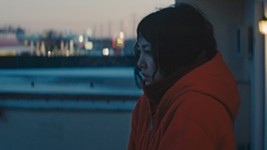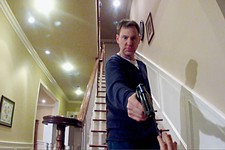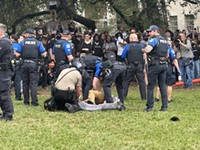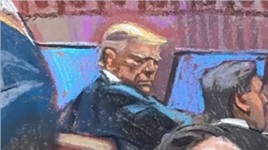The Camera Is Mightier Than the ...
Trapped inside a Venezuelan coup: Kim Bartley and Donnacha O'Briain's 'The Revolution Will Not Be Televised'
By Michael King, Fri., March 7, 2003

The Revolution Will Not Be Televised, receiving its U.S. premiere at the SXSW Film Festival March 7, is an extraordinary documentary of the Hugo Chavez government in Venezuela, and most particularly of the events leading up to and during the attempted overthrow of the Chavez government on April 11 and 12, 2002. (A shorter version of the film, titled Chavez: Inside the Coup, has played on European television.) Co-directors Kim Bartley and Donnacha O'Briain were not only present during the public events surrounding the coup -- a brief and finally unsuccessful attempt by Venezuelan business, media, and military elites to seize power from the constitutionally elected Chavez government -- they were inside the presidential palace grounds during the early-morning hours of April 12, as Chavez and his administration expected a direct bombing attack on the palace.
Chavez left the palace in the custody of military officers, and an interim president -- Chamber of Commerce President Pedro Carmona -- briefly took his place. But Chavez never agreed to resign, in the end most military officers remained loyal to the constitutional government, and the film concludes with Chavez's triumphant return less than 48 hours after his departure.
The title recalls the famous poem by Gil Scott-Heron, but precisely refers to the central role of the Venezuelan media, especially the private television networks, in advocating, preparing, and indeed directly participating in the coup. The film vividly portrays the overlapping class and racial divisions in Venezuelan society, the attempts by the Chavez government to organize populist democracy, and the strong resistance of the business and union elites to the nationalization of Venezuela's primary source of wealth, the oil industry.
The failed coup provides an astonishing emotional climax to the film that directly contradicts the internationally publicized version of the conflict: that it was a spontaneous popular response to government repression, and particularly to Chavista violence against anti-government demonstrators on April 11. Bartley and O'Briain were eyewitnesses to the actual events, and The Revolution Will Not Be Televised provides a unique record of a climactic moment in Venezuelan and South American history.
The Chronicle interviewed Bartley and O'Briain via e-mail from their homes in Ireland. The following has been lightly edited for clarity.
Austin Chronicle: How did you come to do the film and to gather the support for the project?
Kim Bartley and Donnacha O'Briain: We set out to do a film about President Chavez and the political situation in Venezuela. We share an interest in Latin American politics and issues around globalization, and we've both worked together in the past on projects, though not as co-directors. We funded the first exploratory trips to Venezuela ourselves and then got development funding from the Irish Film Board. Once they saw the pilot material they came on board with finance, and the Irish broadcast network RTE also helped out. Of course, when the coup happened, interest in the project grew, and other European broadcasters came on board.
AC: At what point did you realize that a coup was in the offing?
KB and DO: In the weeks running up to the coup, we were increasingly aware of the unbalanced coverage by the local private media, and of the psychological effect this was having on everyone we met. There was a sense that something was about to happen, although we didn't know what. But the atmosphere was tense, and the media was helping create a sense of chaos, fear, and instability.
On the day of the coup, we only began realising what was actually going on when the state TV signal was cut. Up until then, people had been shot and there was a terrible sense of confusion, but still the reality of what was taking place hadn't exactly sunk in. Then later that night, the media started saying that Chavez had fled to Cuba and that he had resigned, when in fact he was in the palace -- and so were we. It became clear then that something very calculated and sinister was unfolding.
AC: How was your access arranged, and how did it transfer from the Chavez government to the Carmona regime?
KB and DO: We had spent months in Venezuela before the coup ever happened, getting to know people all over the country, from all walks of life, and spending as much time as possible in the presidential palace, where we got to know Chavez's entourage and Chavez himself. It was a slow and sometimes very frustrating process, but when the coup happened, it meant that we had a lot of contacts and that within the palace no one paid any attention to us -- we just blended in.
On the day the "interim" government took over we were in Caracas, but the new regime's police clampdown was frightening, and we stayed away from the palace. We got dozens of calls from people telling us that their houses had been raided and telling us to get out of the country -- and more importantly, to hide the tapes we'd shot the night before.
The airport was closed, so we hid the tapes and decided to shoot as much as we could in the streets, to document the repression we were witnessing. We also filmed a lot off the TV, because the blackout was astounding. Meanwhile one of the official cameramen from the palace press office had turned up for work as usual, reluctant to lose his job despite the change in government, and he filmed in the palace as the opposition took over. When things turned around the following day we met him, and when he told us he'd been there we asked him for his footage. He generously handed over the tapes of Carmona's swearing-in ceremony.
AC: The quasi-official international story is that the coup was a response to violence of the Chavez supporters against the opposition march on the palace and, more broadly, to oppressive Chavez policies. Your film specifically contradicts the former and also suggests the media coverage of the Chavez government is greatly dishonest. Can you recount what you know about the snipers and the shooting?
KB and DO: The details of who the snipers were is something we don't have an answer to. Having witnessed the shootings and spoken to many people who were there at the time, it is clear that there were snipers in some of the buildings. They shot indiscriminately at both Chavez supporters and people in the march against him, and almost every victim we saw had shots to the head.
There is an aspect of that day that we did not expand on in the documentary, and that was the role played by the Metropolitan Police -- a police force controlled by one of the mayors of Caracas, one of the most virulent opponents to Chavez. We were there and witnessed that the opposition march was not and had never been below the bridge where the infamous footage was filmed of the Chavez supporters firing -- supposedly at the crowd below.
The shots [on the crowd in front of the palace] seemed to come from a building nearby. (At this point, we moved back toward the palace and did not witness the alleged involvement of the police, but we have gleaned the following from talking to people and viewing raw footage from various sources.) The Metropolitan Police approached the bridge in riot vehicles. Some began firing at the bridge. There were Chavez supporters on the bridge who did shoot back both in the direction of the snipers and at the police tanks which stayed about two blocks away from the bridge. But the Chavez supporters on the bridge were not firing at the opposition march.
The fundamental point we chose to highlight however was the spin by the media. The media chose to focus on the Chavez supporters who were firing, and to use a tight shot of these guys to say that Chavez had ordered his supporters to fire on innocent women and children marching below the bridge. The shots of the empty street below were not shown. We were there, and it was simply not true that they were firing on innocent marchers.
AC: This was an unusual coup, in that it was (relatively) nonviolent, and amazingly brief. What do you think were the crucial factors that defeated the coup (at least for now) and allowed Chavez to re-assume the presidency and re-form his government?
KB and DO: At least 11 people were killed on the day of the marches, and as we said, these were people from all sides of the political spectrum. Those deaths should not have happened and were extremely traumatic and upsetting for everyone involved.
On the day of the marches, the violence did not go beyond this choreographed massacre, and the army did not get actively involved, as has happened so many times before in Latin America.
In our opinion the crucial factors that defeated the coup were quite straightforward. Chavez maintained the support of the lower ranks within the army, who were [initially] fooled by the media and by the declarations of the top brass but who remained loyal. Given a day to regroup and realise what was actually going on, they decided to act and to defend democracy and the constitution.
In the bigger picture, we have no doubt that the fundamental factor which led to people taking to the streets was the emphasis put by Chavez on education, and on the sanctity of the constitution which was voted in by referendum in 1999. In itself it is a very progressive constitution, which allows for any elected member of government to be removed by referendum halfway through their term.
Under Chavez, people who never before participated in the country's political life began getting involved and educating themselves about their rights, so that when the coup happened they knew they had the right to defend what was legally theirs and what they had voted for. We were constantly amazed by the level of consciousness in the people we met in Venezuela, even in the most remote and poorest areas, where illiteracy is slowly being eradicated.
AC: The Venezuelan media, except for the government network, were virtually a nonstop anti-government propaganda machine, even to the point of apparently rehearsing in advance the coup announcements. Can you comment on the role of the Venezuelan media?
KB and DO: The role played by the media in Venezuela was very indicative of the power held by the media today, not just in Venezuela but across the world, as huge media networks go increasingly global and their power increases.
As their ties to the establishment and to large corporations with their own links to government become stronger, the news we are being fed becomes more controlled to suit interested parties. This was certainly the case in Venezuela, and the power of the media was frighteningly evident when you could see the effect the reports were having on the population. Unfounded news reports and fear-mongering were the order of the day, and they really got to people. On the morning after Chavez was taken away, one of the channels invited some of the people who had actively participated in the coup to a panel discussion [reproduced in part in the film], in which they bragged and congratulated each other on a job well done, revealing all the details of the plot live on air.
AC: The Chavez government remains in a difficult predicament because of economic disruption and a split in the country over what should be done. Do you see civil war as a real possibility, or can the government maintain its poor and working-class base, yet win over enough of the opposition to maintain stability and progress?
KB and DO: It's hard to say what the future holds for Venezuela. The constant disruption by the opposition, and the deep divide this has created within Venezuelan society, makes for a very unstable atmosphere. The recent strike crippled the country's economy, which relies almost solely on oil production despite recent efforts to diversify and develop other industries. The coup certainly helped to strengthen Chavez's support base, but the constant efforts at destabilization have worn other sections of society down.
The biggest problem in Venezuelan politics is the lack of an organised opposition with a united front and workable alternative to Chavez. After years of corruption and pseudo-democracy, the political game is a new concept, and both sides remain largely disorganised.
Chavez's strongest card remains that he has awakened people to the fact that they have a voice, and they will not be walked over again. Whether Chavez stays or goes, that newfound confidence and self-belief will remain in those who have learned to value their contribution to their country's development under Chavez's government.
AC: Any other comments either about the film or about the situation in Venezuela?
KB and DO: The response we've had so far has been incredible -- particularly from people who couldn't have picked Venezuela out on a map before this. The reason, we think, is that the film brings out issues which go far beyond Venezuela and touch us all, particularly the role of the media in a globalized world. And then of course, there's people power, which is something we tend to forget about these days -- people march against war and still feel that their voices are not being heard or taken into consideration. Venezuela proved to us that we can all play a part in bringing about the changes we believe are necessary to make a better future for us all.
As regards to the role played by the United States, it is something we chose not to set out to prove in any way. We both feel that the U.S. response to the events -- as a member of the Organization of American States and supposedly a signatory of the democratic charter -- was unforgivable. Many other details have emerged since the failed coup -- of funding to the opposition, and various other levels of involvement. What is important now is that the Venezuelan debacle be the last of its kind in Latin America. This year is the 30th anniversary of the coup against [Salvador] Allende in Chile.
AC: Are you returning to Venezuela to continue this documentary work?
KB and DO: The documentary is finished and we're both moving on to new projects -- maybe after a short, badly needed rest! But we'll still follow events closely in Venezuela and the rest of Latin America, where a new move towards independence from U.S. foreign policy and neo-liberal trends has begun to develop in other places, like Brazil and Bolivia. ![]()












